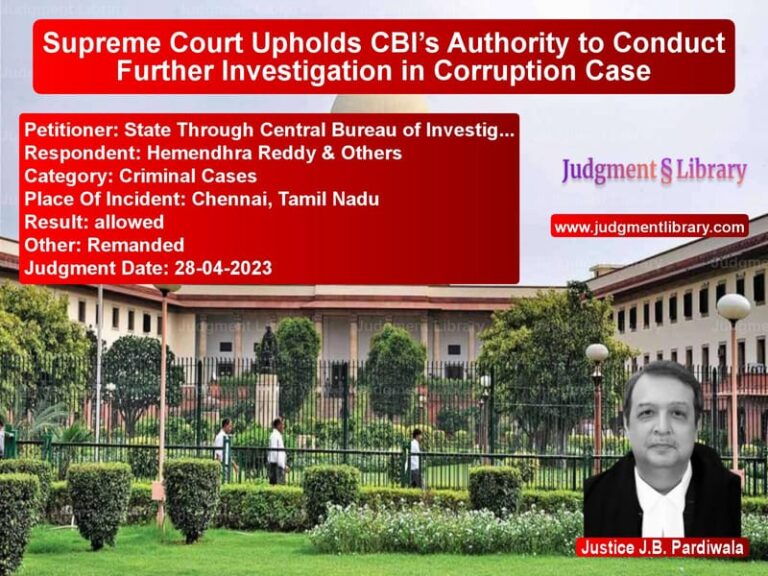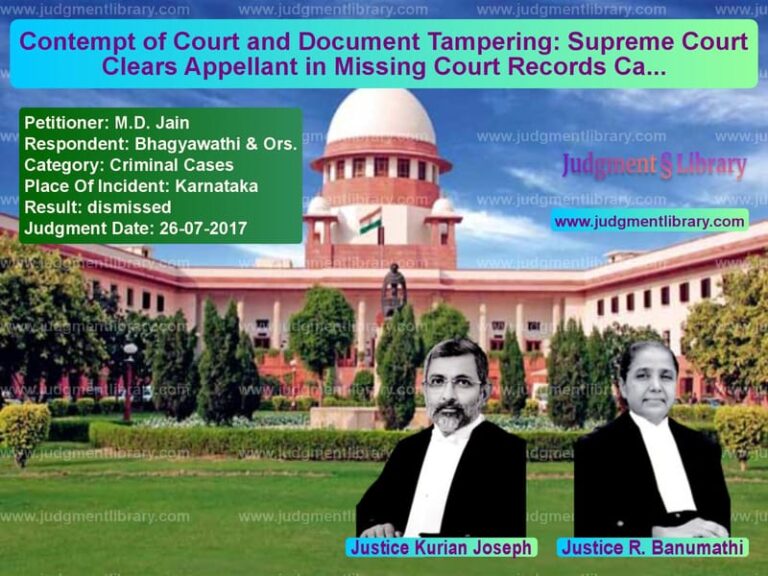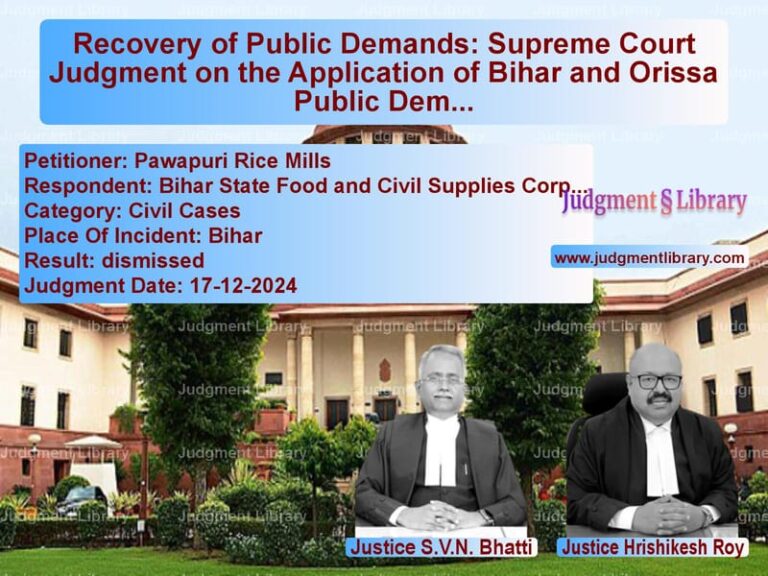Land Acquisition Dispute: Supreme Court Upholds ITBP’s Urgency Clause Invocation
The case of Union of India & Anr. v. Mohiuddin Masood & Ors. pertains to the acquisition of land in Kanpur Nagar for the establishment of a battalion headquarters of the Indo-Tibetan Border Police (ITBP). The Supreme Court had to determine whether the urgency clause under the Land Acquisition Act, 1894, was correctly invoked by the State Government, and whether the compensation awarded to the landowners was fair and lawful. The decision reaffirmed the government’s authority to acquire land in urgent situations while ensuring that affected landowners receive proper compensation.
Background of the Case
The controversy began when the State Government of Uttar Pradesh issued a notification under Section 4 of the Land Acquisition Act on September 2, 2009, announcing its intention to acquire land for the ITBP. Subsequently, a notification under Section 6 was issued on December 11, 2009, invoking the urgency clause under Section 17 of the Act. The urgency clause enabled the government to bypass the mandatory public hearing and objections process under Section 5A.
The landowners, led by Mohiuddin Masood, challenged the acquisition, arguing that there was no real urgency to justify invoking the urgency clause. They also alleged that the compensation awarded was inadequate. The Allahabad High Court ruled in favor of the landowners, quashing the acquisition process and directing that compensation be calculated under the more beneficial Right to Fair Compensation and Transparency in Land Acquisition, Rehabilitation, and Resettlement Act, 2013.
Appeal Before the Supreme Court
The Union of India and ITBP challenged the High Court’s decision, arguing that the land was urgently required due to increasing counter-insurgency operations, law and order duties, VVIP security duties, and disaster management operations.
Arguments of the Appellants (Union of India & ITBP):
- The acquisition was made in the interest of national security, and any delay in establishing the battalion headquarters could compromise safety and preparedness.
- The three-month gap between the notifications under Sections 4 and 6 indicated an expeditious process, demonstrating genuine urgency.
- The land acquisition process had already progressed significantly, and reversing it would cause wastage of public funds.
- Nearly 95% of the acquired land had already been developed for ITBP use, making restitution to the original owners impractical.
Arguments of the Respondents (Landowners):
- The government failed to justify the invocation of the urgency clause, as the proposal to acquire the land had been under consideration for a long time.
- The acquisition process lacked transparency, and the landowners were denied their statutory right under Section 5A to raise objections.
- The High Court was correct in ruling that the compensation should be awarded under the 2013 Act, which provides a fairer assessment of market value.
Supreme Court’s Observations
The Supreme Court examined whether the invocation of the urgency clause was justified and whether the High Court had erred in striking down the acquisition.
“The High Court has materially erred in holding that invocation of the urgency clause was bad. The ITBP had an urgent need for land due to increasing counter-insurgency operations and disaster management responsibilities. The process was completed in a reasonable timeframe.”
The Court also noted that:
- The land acquisition process was carried out in a timely manner, with minimal delays.
- The development on the acquired land had progressed significantly, making restitution impossible.
- The landowners had been given opportunities to collect their compensation but had refused to do so.
Final Judgment
The Supreme Court upheld the acquisition and set aside the High Court’s ruling. The key takeaways from the judgment were:
- The invocation of the urgency clause was valid and legally justified.
- The compensation process had been duly followed, and the landowners were not entitled to compensation under the 2013 Act.
- The development of the land for ITBP purposes was a critical factor in the decision to uphold the acquisition.
Implications of the Judgment
The ruling reinforces the principle that land acquisitions made in the interest of national security and public order should not be easily reversed. However, it also highlights the importance of transparency and due process in land acquisition cases. The case sets a precedent for future disputes involving the urgency clause under the Land Acquisition Act.
Conclusion
The Supreme Court’s decision reaffirmed the government’s power to acquire land in urgent cases while ensuring that landowners receive just compensation. The ruling clarified that development for national security purposes can override procedural objections, provided the acquisition follows a reasonable and timely process. This judgment serves as an important reference for similar land acquisition disputes in the future.
Petitioner Name: Union of India & Anr..Respondent Name: Mohiuddin Masood & Ors..Judgment By: Justice Arun Mishra, Justice M.R. Shah, Justice B.R. Gavai.Place Of Incident: Kanpur Nagar, Uttar Pradesh.Judgment Date: 19-08-2019.
Don’t miss out on the full details! Download the complete judgment in PDF format below and gain valuable insights instantly!
Download Judgment: Union of India & Anr vs Mohiuddin Masood & O Supreme Court of India Judgment Dated 19-08-2019.pdf
Direct Downlaod Judgment: Direct downlaod this Judgment
See all petitions in Property Disputes
See all petitions in Landlord-Tenant Disputes
See all petitions in Damages and Compensation
See all petitions in Judgment by Arun Mishra
See all petitions in Judgment by Mukeshkumar Rasikbhai Shah
See all petitions in Judgment by B R Gavai
See all petitions in allowed
See all petitions in Quashed
See all petitions in supreme court of India judgments August 2019
See all petitions in 2019 judgments
See all posts in Civil Cases Category
See all allowed petitions in Civil Cases Category
See all Dismissed petitions in Civil Cases Category
See all partially allowed petitions in Civil Cases Category







